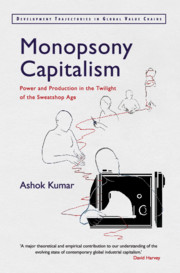
-
Select format
-
- Publisher:
- Cambridge University Press
- Publication date:
- 15 January 2020
- 29 October 2020
- ISBN:
- 9781108764810
- 9781108731973
- Dimensions:
- Weight & Pages:
- Dimensions:
- (228 x 152 mm)
- Weight & Pages:
- 0.36kg, 290 Pages
You may already have access via personal or institutional login
Book description
This book explores the combination of capital's changing composition and labour's subjective agency to examine whether the waning days of the 'sweatshop' have indeed begun. Focused on the garment and footwear sectors, it introduces a universal logic that governs competition and reshapes the chain. By analysing workers' collective action at various sites of production, it observes how this internal logic plays out for labour who are testing the limits of the social order, stretching it until the seams show. By examining the most valorised parts of underdeveloped sectors, one can see where capital is going and how it is getting there. These findings contribute to ongoing efforts to establish workers' rights in sectors plagued by poverty and powerlessness, building fires and collapses. With this change and a capable labour movement, there's hope yet that workers may close the gap.
Awards
2021, ASA Paul Sweezy Outstanding Book Prize
2022, PEWS Wallerstein Memorial Book Award
Reviews
‘Just as the dynamics of capitalism shuts down opportunities for labour organizing, it can also open up new possibilities. In this important book Ashok Kumar traces the history and geographical spread of the garment industry, how retailers have secured ever more power that has led to the restructuring of the global production chain and increased the structural power of the most exploited workers. Exemplary engaged research that challenges the fatalism accompanying neoliberalism.'
Michael Burawoy - University of California, Berkeley
‘The sweatshop economy is pervasive in today's global capitalism. Ashok Kumar charts its evolution, shows how market power is becoming concentrated, and also charts the rise of worker resistance which exploits vulnerabilities in the new production systems.'
Richard Hyman - London School of Economics and Political Science
‘A major theoretical and empirical contribution to our understanding of the evolving state of contemporary global industrial capitalism.'
David Harvey - City University of New York
‘With surgical precision, Ashok Kumar opens up key sites in global supply chains to rigorous investigation and offers urgent insights about how sweatshops work, and how they might work differently. Powerful and profoundly illuminating, this book is a must-read for all those concerned with labour and its movements, and supply chain capitalism and its alternatives.'
Deborah Cowen - University of Toronto
‘Unlike many a book on capitalism and labour, Ashok Kumar not only goes global, but also, most significantly, moves into the innards of the most labour-intensive sectors. Thus, beyond the familiar narratives of exploitation, he proposed a theory of monopsony power in global value chains which brings together the inner logics of capital and the collective power of workers in analysing the evolution of the sweatshop.'
Saskia Sassen - Columbia University, New York
‘This ability to generate new conceptual debates on the basis of thorough and extensive empirical work defines Monopsony Capitalism as a magisterial accomplishment. Ashok Kumar’s innovative analysis will shape the future research directions of value chain upgrading, labor politics, and economic theory.’
Kean Fan Lim Source: The AAG Review of Books
‘Monopsony Capitalism is ambitious, engaging, and provocative, revealing much about the dynamics of conflict and regulation, mainly in the global garment industry ... [a] stimulating contribution that deserves serious attention by all advanced students and scholars interestedin eliminating sweatshops.'
Stephen J. Frenkel Source: ILR Review
Contents
Metrics
Altmetric attention score
Full text views
Full text views help Loading metrics...
Loading metrics...
* Views captured on Cambridge Core between #date#. This data will be updated every 24 hours.
Usage data cannot currently be displayed.
Accessibility standard: Unknown
Why this information is here
This section outlines the accessibility features of this content - including support for screen readers, full keyboard navigation and high-contrast display options. This may not be relevant for you.
Accessibility Information
Accessibility compliance for the PDF of this book is currently unknown and may be updated in the future.


